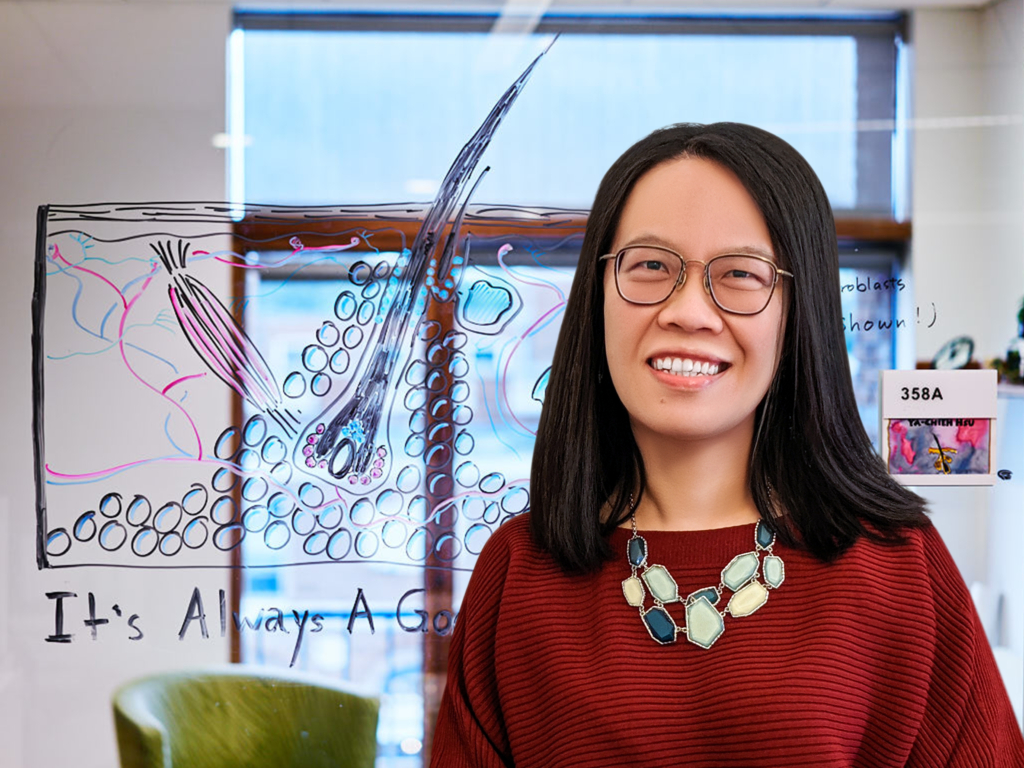
Ya-Chieh Hsu, Ph.D. ’08, to present this year’s Wylie Vale Memorial Lecture
Today’s Wylie Vale Memorial Lecture, hosted by Baylor College of Medicine’s Department of Integrative Physiology, features alumna Ya-Chieh Hsu, Ph.D. ’08, associate professor of Stem Cell and Regenerative Biology at Harvard University and a principal faculty member at the Harvard Stem Cell Institute. Dr. Hsu will present work on how body physiology regulates stem cells in the skin via the nervous system and endocrine system.
What influenced your career in science?
As a kid, I was interested in science but was unaware of the potential careers it offered, since no one I knew had a science-related job. In high school, I worked in Henry Sun’s lab at Academic Sinica in Taiwan, which focused on eye development, and my task was to express a gene potentially important for eye determination in the fly’s leg. The fly wouldn’t hatch, so I carefully peeled off the pupal case under the microscope, and suddenly the leg of the fly came out, with this big red compound eye on it. I was completely blown away and could not believe what I saw. That was all it took – I thought, OK, there is nothing cooler than this. I wanted to do research, although I didn’t have any idea of what that meant or what it would take.
What brought you to Baylor College of Medicine?
For graduate school, I wanted to come to the United States because there seemed to be this rich abundance of opportunities for scientific research. When I interviewed for the Developmental Biology Program (now the Development, Disease Models & Therapeutics Graduate Program) at Baylor, I was immediately drawn to it. I liked that it had a theme to connect students and faculty who are interested in developmental biology but also had a large number of exceptional faculty working on a wide range of topics broadly related to all aspects of development. I also liked its rigorous curriculum and the highly interactive nature among students and between students and faculty. I had a feeling that it would be the perfect place for me — and it was.
During your time as a Baylor student, who or what was the most impactful on your education?
My Ph.D. advisor, Kwang-Wook Choi, Ph.D., was an exceptional mentor and scientist. He gave me a lot of room to grow at my own pace. I learned all about research from Dr. Choi, and he always treated me as an equal scientific peer, valuing my ideas and encouraging me to explore the directions I was most interested in. Under his generous mentorship, my interest in scientific research took root and flourished, and I grew into an independent scientist.
I am also indebted to Hugo Bellen, D.V.M., Ph.D., who was the program director at the time. Dr. Bellen cared about every student in the program and led and invested in training strategies that made it one of the best Ph.D. training programs ever. He showed me the true meaning of leadership and impact.
Tell us a little about what you will be presenting as this year’s Wylie Vale Memorial Lecturer and what it means to present at your alma mater.
I was truly honored and humbled by this invitation – it meant so much to me on so many levels. Wylie Vale, Ph.D. ’69, was one of the most influential neuroendocrinologists of our time. I was inspired by much of his work showing how the brain interacts with the endocrine system to control a wide range of body physiology. In addition, my time at Baylor was the most formative years of my life and scientific career, and it means the world to me to be able to present my work here again.
I will be presenting our work on how body physiology regulates stem cells in the skin via the nervous system and endocrine system, which I hope will honor Dr. Vale’s lifetime contribution to neuroendocrinology.
Tell us about your lab’s research focus related to stem cell biology and how that work may hold promise for treatment in autoimmune diseases or other applications.
The overarching mission of my lab is to discover how development, regeneration, disease and aging are shaped by interactions between diverse cell types, by physiological changes and by changes of the external environment. We focus on the skin, an accessible organ that protects organisms from external insults, consists of abundant cell types including multiple populations of somatic stem cells and is amenable to rapid in vivo genetic manipulations and imaging.
Our work may inform strategies to halt or reverse stress- and age-related tissue changes, discover ways to protect tissues from radiation- or chemotherapy-induced damage and identify ways to accelerate wound healing.
What big takeaways have you learned so far during your career and how has Baylor shaped you as a scientist?
One of my biggest takeaways was nicely summed up by American novelist E.L. Doctorow: It’s like driving at night. You may only be able to see as far as your headlights, but you can make the whole trip that way. I benefit greatly from my naïve optimism. I am the kind of person who jumps in headfirst as long as something seems exciting, without first testing how cold the water is or knowing what’s in the water. Over time, I’ve learned to get comfortable with being uncomfortable — it means I’m growing or doing something challenging, and that makes life so much more interesting.
The other big takeaway is that science is an amazing career that you can only pay forward. I am grateful for the extraordinary mentorship I received at Baylor and throughout my career. And I now have the opportunity to pay it forward by training the next generation of scientists. I don’t take this opportunity lightly, and I hope that my interactions with my trainees honor those of my mentors.


